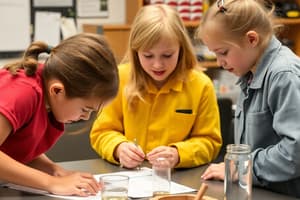Podcast
Questions and Answers
What is the purpose of classifying in scientific processes?
What is the purpose of classifying in scientific processes?
- To interpret data gathered from experiments
- To communicate results of an experiment
- To create a hypothesis for experimentation
- To group objects based on similarities (correct)
Which step involves maintaining consistency in non-relevant factors while adjusting the primary variable?
Which step involves maintaining consistency in non-relevant factors while adjusting the primary variable?
- Controlling Variables (correct)
- Experimenting
- Hypothesizing
- Communicating
How is an operational definition significant in scientific studies?
How is an operational definition significant in scientific studies?
- It allows for precise measurement and clarity (correct)
- It assists in classifying similar objects
- It communicates findings effectively
- It predicts the experiment's outcome
What is the main objective of hypothesizing in the scientific process?
What is the main objective of hypothesizing in the scientific process?
What does the step of interpreting data in scientific inquiry primarily focus on?
What does the step of interpreting data in scientific inquiry primarily focus on?
What type of observation involves the use of numbers and devices?
What type of observation involves the use of numbers and devices?
Which of the following best describes inferring?
Which of the following best describes inferring?
Which statement about measuring is true?
Which statement about measuring is true?
Which of the following is an example of a qualitative observation?
Which of the following is an example of a qualitative observation?
What is considered a physical quantity?
What is considered a physical quantity?
Flashcards are hidden until you start studying
Study Notes
Science Process Skills Overview
- Science process skills are transferable abilities applicable across various scientific disciplines.
- SAPA categorizes these skills into Basic and Integrated types.
Basic Science Process Skills
-
Observation:
- Qualitative Observation: Uses descriptive words. Example: "The truck is heavy."
- Quantitative Observation: Uses numerical data. Example: "The man is 185 centimeters tall."
-
Inferring:
- Involves explaining observations based on previous knowledge. Example: "The pavement is wet; it may have rained."
-
Measuring:
- Involves assessing dimensions of objects or events using tools or estimates.
-
Physical Quantity:
- Refers to measurable attributes of objects, expressed as values using instruments or senses.
Integrated Science Process Skills
-
Communicating:
- Sharing information through various formats, including words and graphics.
-
Classifying:
- Grouping objects based on shared characteristics.
-
Controlling Variables:
- Identifying and isolating significant variables in experiments while maintaining constant conditions.
-
Defining Operationally:
- Precise definition of concepts by explaining how they are measured and under what conditions.
-
Hypothesizing:
- Formulating predictions about experimental outcomes.
-
Experimenting:
- Conducting fair experiments to test hypotheses.
-
Interpreting Data:
- Analyzing and explaining observations in a coherent manner.
-
Using Space-Time Relationships:
- Constructing mental models of processes or events and describing changes over time.
Systems of Units
-
Physical quantities can be measured using various unit systems.
-
Human-based Units:
- Derived from body parts. For example: Length (fathom, cubit), Mass (picul), Time (nimesha).
-
English/British/Imperial System:
- Common units include Length (mile, yard, foot), Mass (pound), Time (second).
-
CGS System:
- Length measured in centimeters, mass in grams, and time in seconds.
-
MKS/MKSA/Metric System:
- Commonly uses Length (meter), Mass (kilogram), Time (second), Electric Current (ampere), Temperature (degree Celsius).
-
International System (SI):
- Comprehensive unit system consisting of Length (meter), Mass (kilogram), Time (second), Electric Current (ampere), Temperature (kelvin), Amount of substance (mole), and Luminous intensity (candela).
Predicting
- Predicting involves forecasting future events based on observations and prior experiences. Example: "Dark clouds suggest it may rain."
Communicating
- The process of conveying ideas or information through diverse modes, including graphic symbols and verbal descriptions.
Classifying
- Identifying similarities and differences to categorize objects or phenomena and grouping them based on shared traits.
Studying That Suits You
Use AI to generate personalized quizzes and flashcards to suit your learning preferences.




